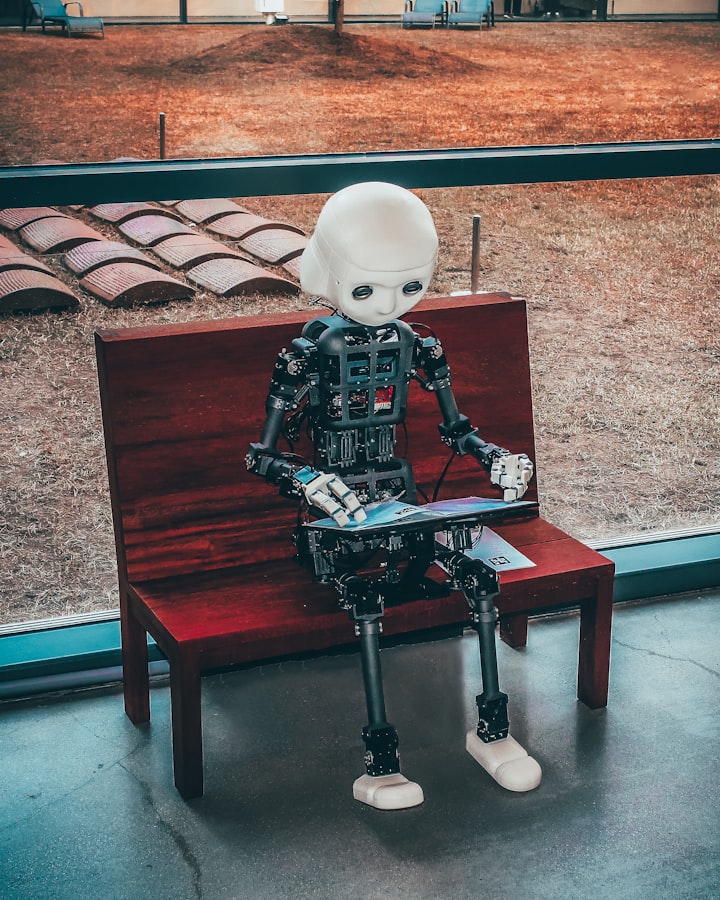How Artificial Intelligence will change the future?
The article discusses the potential impact of Artificial Intelligence (AI) on various aspects of our lives. AI can analyse vast amounts of data and make decisions faster and more accurately than humans, leading to increased automation, improved systems, and the creation of new products and services.

Artificial Intelligence (AI) is poised to revolutionize the future as we know it. With its ability to analyse vast amounts of data and make decisions faster and more accurately than humans, AI is set to transform industries from healthcare to finance, transportation to retail. As AI technology continues to advance, we can expect to see increased automation, more efficient systems, and even the creation of new products and services. It’s an exciting time to be alive as AI will shape the world in ways we can only imagine.
AI will transform the future through its ability to analyze data and make decisions faster and more accurately than humans. This will lead to increased automation, improved systems, and new products and services. Get ready for a world shaped by AI.
A human like robot in near future
“How Artificial Intelligence Will Change the World?”
AsAI continues to evolve, it’s painting a picture of a future where machines and humans work together in harmony. Imagine a world where robots handle the tedious and mundane tasks, while humans focus on creativity and problem-solving. Industries like healthcare, finance, transportation, and retail will see a significant boost in efficiency, accuracy and innovation.
Another change we can expect is the creation of new products and services. AI has the potential to generate new ideas and solutions that were previously unimaginable, leading to innovation and progress.
Moreover, AI will also play a crucial role in solving some of the world’s biggest challenges, such as climate change and global health. By analysing data and predicting outcomes, AI can help governments and organizations make informed decisions that can positively impact the world.
“The EVOLUTION of AI”
Artificial Intelligence (AI) has come a long way since its inception. The field of AI began in 1956 when a group of researchers gathered at Dartmouth College for a conference and coined the term “Artificial Intelligence.” The early days of AI were marked by optimism and a belief that machines would soon be able to perform any intellectual task that a human can.
However, the development of AI was slow and marked by several setbacks, including a lack of funding and a lack of progress in creating intelligent machines. It wasn’t until the late 1990s and early 2000s that AI began to experience a resurgence. The growth of the internet and the availability of massive amounts of data enabled AI to make significant progress.
Today, AI has advanced to the point where it is capable of performing complex tasks and decision-making, and it is already having a significant impact on many industries. AI is being used in a variety of applications, including natural language processing, computer vision, and self-driving cars.
The future of AI is incredibly exciting, with the potential for even more advancements in the years to come. As AI continues to evolve, we can expect to see it play an increasingly important role in our lives, transforming the way we work, live, and interact with the world around us.
“Artificial Intelligence Future”
The future of Artificial Intelligence (AI) is both exciting and uncertain. On one hand, AI has the potential to revolutionize the way we live and work, leading to increased efficiency and productivity, and even the creation of new products and services. On the other hand, there are also concerns about the impact that AI may have on employment, privacy, and the overall balance of power in society.
One of the most promising areas for the future of AI is the development of autonomous systems. Self-driving cars, drones, and other AI-powered machines have the potential to significantly improve our daily lives and transform the way we travel and interact with the world around us.
In the healthcare industry, AI has the potential to revolutionize the way we diagnose and treat diseases. AI systems can analyse vast amounts of medical data and make more accurate diagnoses, leading to improved patient outcomes and a reduction in healthcare costs.
Another exciting area for the future of AI is the development of smart cities. AI-powered systems can analyse data from a wide range of sources, including traffic patterns and energy consumption, to optimize the functioning of cities and improve the quality of life for residents.
“How AI will change work?”
Artificial Intelligence (AI) is poised to have a profound impact on the way we work. From automation to augmenting human abilities, AI has the potential to transform the workforce in a variety of ways.
One of the most significant changes that AI will bring is increased automation. AI-powered systems and robots will be able to perform a wide range of tasks more efficiently and accurately than humans, freeing up time for other, more complex and creative tasks. This shift could lead to job loss in certain industries, but it will also create new job opportunities in fields such as data analysis and AI development.
Another change we can expect is the enhancement of human abilities through AI. AI has the potential to augment the skills of employees in a wide range of industries, allowing them to work more efficiently and effectively. For example, AI-powered tools can help sales teams to identify the best leads and close deals more quickly, or assist doctors in diagnosing diseases more accurately.
Moreover, AI will also play a crucial role in making work more flexible and personal. AI-powered tools can provide real-time feedback and support to employees, allowing them to work more effectively and efficiently. AI can also help to match employees with the right job, reducing turnover and improving job satisfaction.
“What industries will AI change?”
Artificial Intelligence (AI) has the potential to disrupt a wide range of industries, bringing about significant changes in the way that businesses operate and the services that they offer. Here are a few examples of industries that are already being transformed by AI:
1.Healthcare: AI has the potential to revolutionize the way that medical professionals diagnose and treat diseases. AI-powered systems can analyze vast amounts of medical data, leading to more accurate diagnoses and improved patient outcomes.
2.Transportation: Self-driving cars, drones, and other AI-powered systems have the potential to transform the transportation industry. These systems will make transportation safer, more efficient, and more accessible to everyone.
3.Retail: AI is changing the way that retailers interact with their customers. AI-powered systems can analyze customer data to personalize recommendations and improve the shopping experience.
4.Finance: AI is being used in a variety of applications in the finance industry, from fraud detection to investment analysis. By automating routine tasks and providing real-time insights, AI is making the finance industry more efficient and accessible.
5.Manufacturing: AI is being used in the manufacturing industry to optimize production processes, improve product quality, and reduce waste. AI-powered systems can also assist with predictive maintenance, reducing downtime and increasing efficiency.
These are just a few examples of the many industries that are being transformed by AI. The potential for AI to disrupt and improve a wide range of industries is limitless, and the impact of AI on the global economy will only continue to grow in the years to come.
“AI in the near future”
Artificial Intelligence (AI) is rapidly advancing and its impact on our lives and the world around us is becoming increasingly significant. Here are a few ways in which AI is destined to change the near future:
1.Personalized Services: AI will increasingly be used to provide personalized services to consumers, such as personalized recommendations, personalized health and wellness advice, and personalized financial services.
2.Smart Cities: AI will play a crucial role in creating smart cities, allowing for more efficient and sustainable urban planning, traffic management, and public safety.
3.Improved Healthcare: AI will revolutionize healthcare by improving disease diagnosis, reducing medical errors, and optimizing patient outcomes.
4.Automated Workforce: AI will continue to automate routine and repetitive tasks, freeing up time for employees to focus on more complex and creative tasks.
5.Enhanced Human Capabilities: AI will enhance human abilities by providing real-time feedback, support, and decision-making tools.
Conclusion
As we look towards the future, it’s clear that Artificial Intelligence will play a massive role in shaping our world. Imagine a world where personalized services cater to your every need, smart cities efficiently address urban challenges, healthcare becomes more precise and effective, the workforce becomes more automated and human capabilities are amplified. The possibilities are truly endless. It’s an exhilarating time to be alive as we witness the limitless potential of AI unfold before our eyes.
About the Creator
charanpreet singh
College Student, Passionate learner and writer exploring new opportunities to grow my skills and knowledge. Making positive impact and growing through writing.






Comments
There are no comments for this story
Be the first to respond and start the conversation.